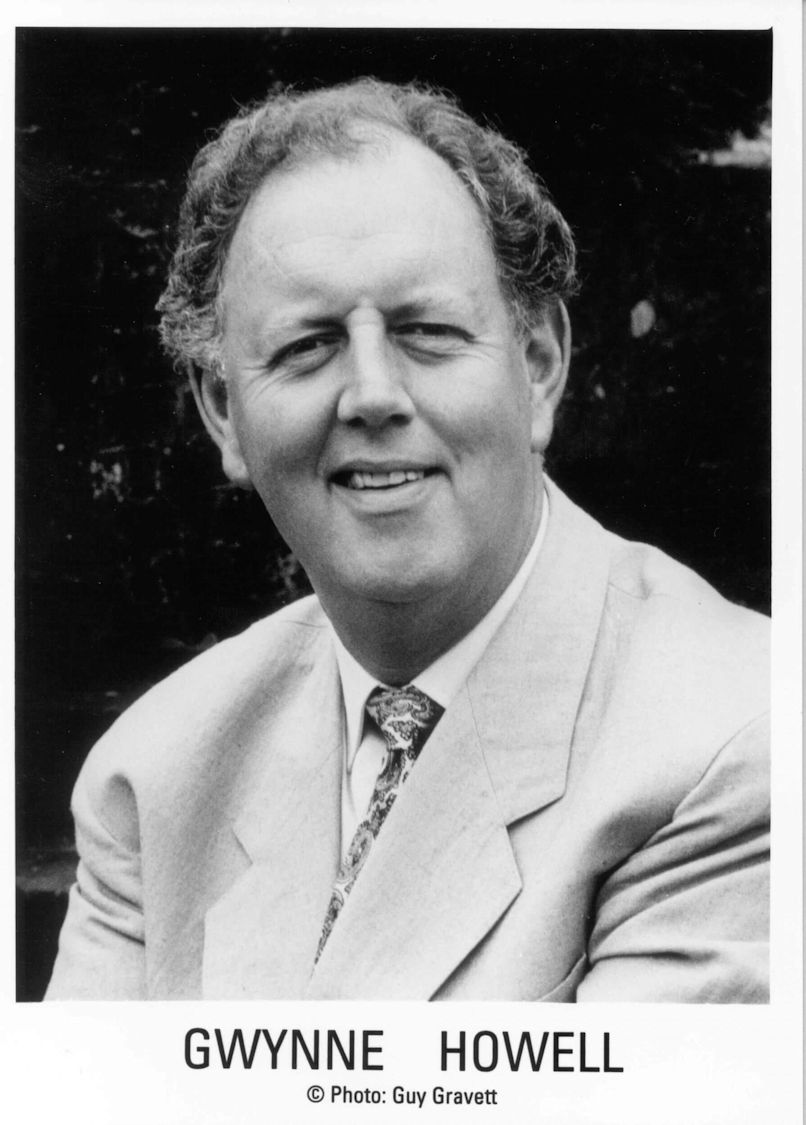

|
Gwynne Howell , one of the world's
leading basses, was born near Swansea June 13, 1938. He obtained
degrees from the University College of Wales and Manchester University
before pursuing his vocal studies at the Royal Northern College of
Music.
Recent North American engagements include Lulu for a return to the Metropolitan Opera, Dansker in Billy Budd, Benoit/Alcindoro in La Bohème for Houston Grand Opera, and Bartolo in Le Nozze di Figaro at Santa Fe Opera. In Europe, he has appeared in Gianni Schicchi for the Royal Opera, and Poppea for Welsh National Opera (televised and serialized by BBC Television). For the English National Opera, he sang The Croucher in the world premiere of The Silver Tassie by Mark Anthony Turnage, Bolkonsky in War and Peace, Schigolch in Lulu, Dansker in Billy Budd and King/Aida. He has appeared in Glyndebourne productions of Pelléas et Mélisande, Manon Lescaut, Don Giovanni, Figaro and Otello; and for Covent Garden as Schigolch in Lulu, Jake Wallace in La Fanciulla del West, Titurel in Parsifal, Old Convict in Lady Macbeth of Mtsensk and in the world première of The Tempest by Thomas Adès. After several successful years with Sadlers Wells Opera, Gwynne Howell moved to the Royal Opera House Covent Garden, where he has sung most of the major bass roles with the company in productions including Aida, Rigoletto, Ballo in Maschera, Luisa Miller, Don Carlos, Simon Boccanegra, Otello, Forza del Destino, Boheme, Tosca, Don Giovanni, Eugene Onegin, Peter Grimes, Billy Budd, Parsifal, Tannhauser, Das Rheingold, Tristan und Isolde, Parsifal, Die Meistersinger, Die Zauberflöte, Khovanshchina, Boris Godunov, Norma, Fidelio, The Flying Dutchman, Katya Kabanova, Le Nozze di Figaro, Salome, Pilgrim's Progress, Mathis der Maler, Palestrina (including a tour to The Metropolitan Opera), and Stiffelio. Gwynne Howell has returned regularly as a guest to English National Opera, most notably as Hans Sachs in Die Meistersinger, Banquo in Macbeth, Gurnemanz in Parsifal, and the title role in Bartok's Bluebeard's Castle, Fidelio, Ariodante, and Khovanshchina. He also sang King Philip in a production of Don Carlos for English National Opera, in which he "brought the whole performance to life and raised it to a higher plane of artistry." Other operatic engagements have included King Mark (Tristan) conducted by Sir Reginald Goodall for WNO, Iolanta for Opera North, The Magic Flute and Ermione for Glyndebourne, the world première of Peter Maxwell-Davies' The Doctor of Mydffai at Welsh National Opera, and concert performances of Les Troyens with Sir Colin Davis and the London Symphony Orchestra. International performances have taken him to the Metropolitan Opera, the Chicago Lyric Opera [see chart below], and the major houses of San Francisco, Santa Fe, Toronto, Hamburg, Cologne, Munich, Paris, Geneva and Bruxelles. Gwynne Howell has appeared all over the world with many leading conductors such as Abbado, Davis, Dorati, Barenboim, Boulez, Bernstein, Giulini, Haitink, Levine, Maazel, Mehta, Muti, Ozawa, and Sinopoli. Since making his US debut with the Chicago Symphony Orchestra and Solti, he has returned regularly for concerts with both that orchestra and the Boston Symphony Orchestra, and also for concert performances of Oedipus Rex and Fidelio with Solti in Chicago, Bluebeard's Castle with Ozawa in Boston and Oedipus Rex with the New York Philharmonic. His many recordings include Mahler Symphony No. 8 with Ozawa and the Boston Symphony Orchestra, Ballo in Maschera and Luisa Miller and Rossini's Stabat Mater with Muti, Tristan with Goodall, the Messiah with Solti, and Beethoven Symphony No. 9 with Masur [DVD shown below]. He has recently completed a new recording of Un Ballo in Maschera for Teldec. In 1998 he was awarded the Commander of the British Empire (CBE). == Biography from Colbert Artists Management
== Names which are links throughout this page refer to my interviews elsewhere on my website. BD |
Gwynne Howell at Lyric Opera of Chicago
1977 - Meistersinger (Pogner) with Ridderbusch,
Lorengar, Johns,
Evans, Riegel, Dooley; Leitner, N. Merrill, O'Hearn,
Tallchief
1985-86 - Samson [Handel] (Manoah) with Vickers, Shade, Plishka, Anderson, Gordon; Rudel, Moshinsky, O'Brien, Tallchief 1986-87 - Parsifal (Gurnemanz - 1 performance of Act 3 (replacing Sotin)) with Vickers, Troyanos, Nimsgern; Perick, Pizzi Lucia (Raimondo) with Gruberová, Shicoff/Di Paolo, Raftery, Kunde; Mackerras, Reichenbach, Bardon Gwynne Howell with the Chicago Symphony
Orchestra
== All performances and recordings conducted by Solti, with Hillis preparing the chorus == April, 1975 [US Debut] - Requiem [Verdi] with
L. Price, Minton,
Pavarotti (Performances in Chicago and Carnegie Hall, NYC)
January, 1976 - Oedipus Rex (Creon) with Pears, Veasey, Gramm, Walker, Klemperer [Program shown below] May, 1977 - Missa Solemnis [Beethoven] with Popp, Minton, Walker; (Performances in Chicago and Carnegie Hall, NYC & Recording - Grammy, Best performance of a choral work) May, 1979 - Fidelio (Don Fernando) with Behrens, Hofmann, Adam, Ghazarian, Sotin, Kuebler (Performances in Chicago and Carnegie Hall, NYC & Recording) April, 1983 - Rheingold (Fasolt) with Nimsgern, Becht, Schnaut, Jerusalem, Tear, Smith, DeGaetani; (Performances in Chicago and Carnegie Hall, NYC) September/October, 1984 - Messiah [Handel] with Hynes (performances)/Te Kanawa (recording),Gjevang, Lewis; Schrader (Harpsichord) January, 1990 - Mass in B minor [Bach] with Lott, van Otter, Blochwitz, Shimmel (Performances, & Recording - Grammy, Best Choral Performance, Classical) 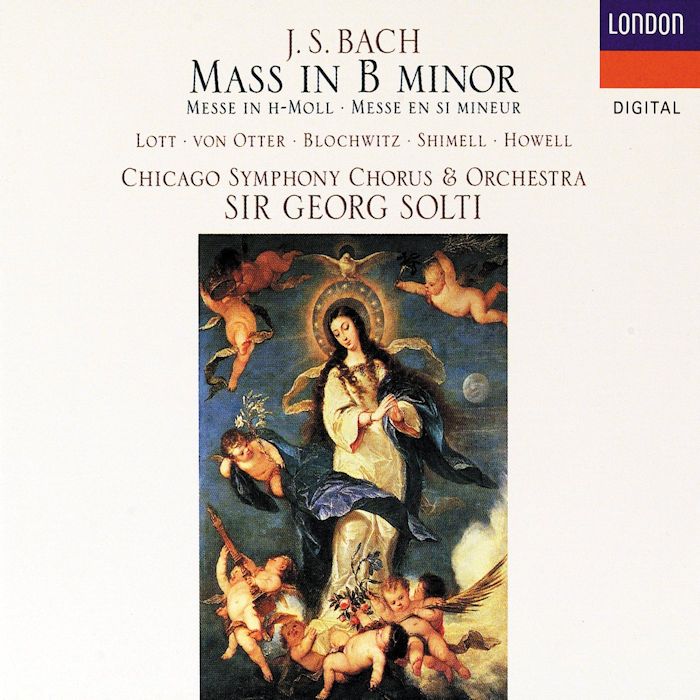
|
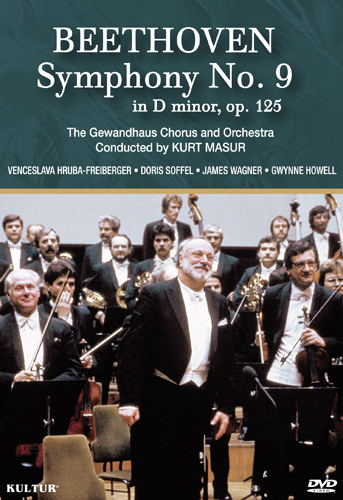 BD: [Waving his hand overhead] I’m actually
going to disappear now...
BD: [Waving his hand overhead] I’m actually
going to disappear now...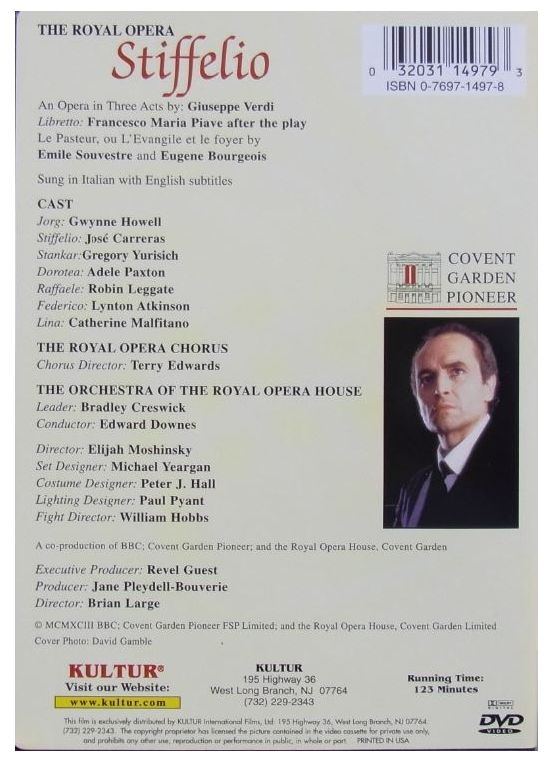 BD: How do you decide if you will or you won’t?
BD: How do you decide if you will or you won’t?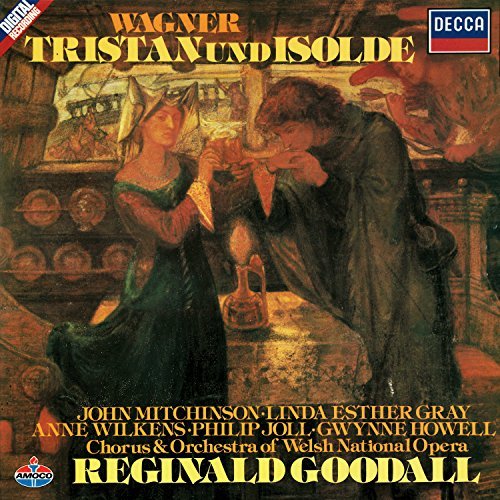 GH: I think they’re probably about
the same. What you have to do is just know where to color the
words. I myself feel that if you’re not German, then there’s a
strong argument about singing the big roles in your own language. This
is not to assist your understanding of it, because you can do that
through the German, but to get a better feeling near to how you feel
about it in your own language with the music. That gives you a better
foundation for an expression in a foreign language. But I’m maybe
wrong...
GH: I think they’re probably about
the same. What you have to do is just know where to color the
words. I myself feel that if you’re not German, then there’s a
strong argument about singing the big roles in your own language. This
is not to assist your understanding of it, because you can do that
through the German, but to get a better feeling near to how you feel
about it in your own language with the music. That gives you a better
foundation for an expression in a foreign language. But I’m maybe
wrong...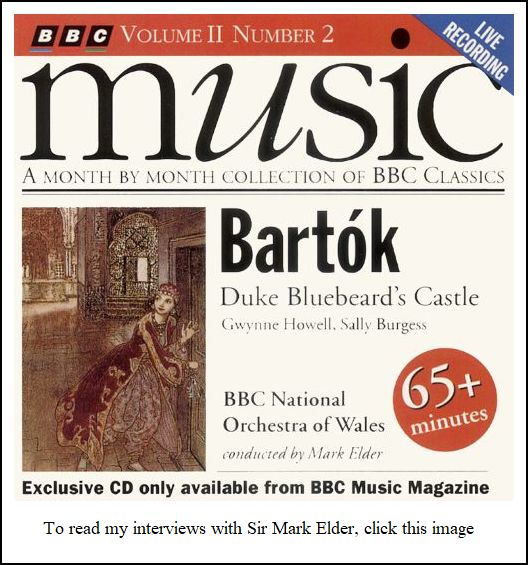 BD: How deeply do you delve
into the various roles that you sing? You said you have sung
a lot of roles not very many times, so do you get a chance to really probe
the character?
BD: How deeply do you delve
into the various roles that you sing? You said you have sung
a lot of roles not very many times, so do you get a chance to really probe
the character?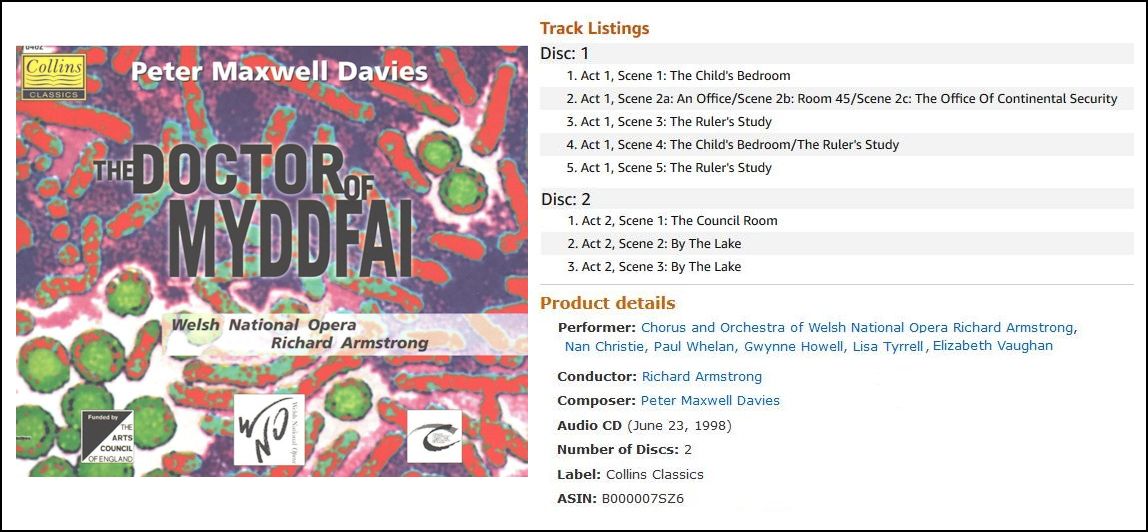
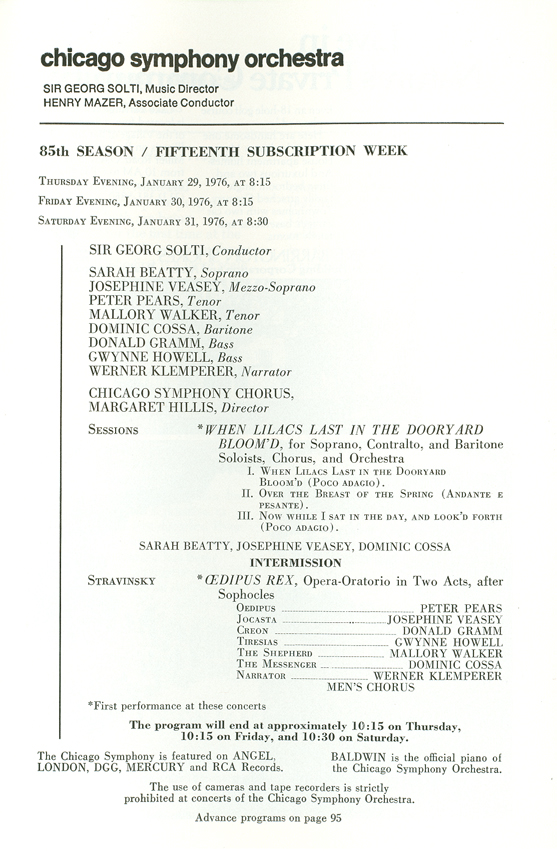 GH: The balance may be in the
audience sometimes. You have music and you have theater.
One feels that in the main, perhaps the American approach is to pay
to be entertained. We were talking about how the American audience
would take to Samson, and I said I was not sure. I
feel that they pay for the ticket, they go in, they sit down, and they
want to be entertained. That means that for one hundred per cent
of the time it has to be pushed out from the stage to the audience for
them to be entertained. I said that Samson isn’t like that.
You’ve got to actually lean forward to involve yourself into it, so
that you can then set up the process of tapping the enjoyment of it
from the stage. It also demands more concentration than the average
opera that the American person might go and see. I don’t know...
that’s only as I feel it.
GH: The balance may be in the
audience sometimes. You have music and you have theater.
One feels that in the main, perhaps the American approach is to pay
to be entertained. We were talking about how the American audience
would take to Samson, and I said I was not sure. I
feel that they pay for the ticket, they go in, they sit down, and they
want to be entertained. That means that for one hundred per cent
of the time it has to be pushed out from the stage to the audience for
them to be entertained. I said that Samson isn’t like that.
You’ve got to actually lean forward to involve yourself into it, so
that you can then set up the process of tapping the enjoyment of it
from the stage. It also demands more concentration than the average
opera that the American person might go and see. I don’t know...
that’s only as I feel it.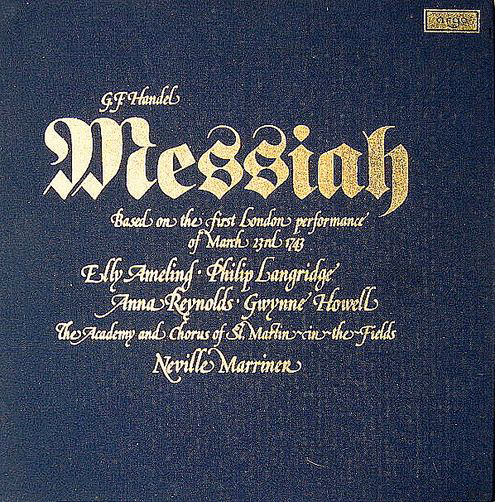 GH: I basically take what comes, but I’ll try
and be careful not to mix too many things. You look carefully
at what you sing before and what you’re going to sing afterwards, to
make sure you’re not trying to demand too many different things from
your singing. A recent example is when Domingo sang Otello
at the Met, and then he followed that with Tosca, which kept
the voice light. He went back to a light way of singing.
GH: I basically take what comes, but I’ll try
and be careful not to mix too many things. You look carefully
at what you sing before and what you’re going to sing afterwards, to
make sure you’re not trying to demand too many different things from
your singing. A recent example is when Domingo sang Otello
at the Met, and then he followed that with Tosca, which kept
the voice light. He went back to a light way of singing.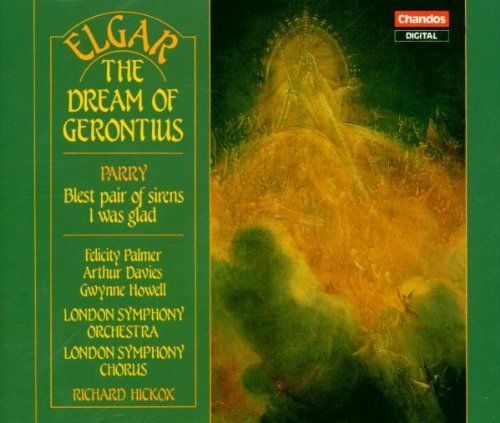 GH: And pretty soon the canvas
is just covered. There’s some vague shapes, but you can’t really
tell much, and in the end, you get bored with it. It’s too much,
an unpleasant trauma because you’re not getting what’s happening on
stage. It’s pretty unreal. If singers are singing that loud,
they’re just shouting at one another. If you get two neighbors
trying to speak to one another while somebody else is revving up a motorcycle,
that’s what it sounds like, and it’s a bit unreal.
GH: And pretty soon the canvas
is just covered. There’s some vague shapes, but you can’t really
tell much, and in the end, you get bored with it. It’s too much,
an unpleasant trauma because you’re not getting what’s happening on
stage. It’s pretty unreal. If singers are singing that loud,
they’re just shouting at one another. If you get two neighbors
trying to speak to one another while somebody else is revving up a motorcycle,
that’s what it sounds like, and it’s a bit unreal. 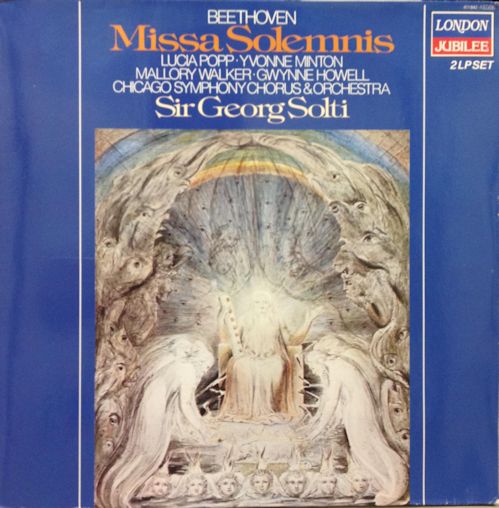 GH: Yes! I don’t discriminate. It’s
hard to say with how I sang it at the ENO whether Covent Garden would
ever ask me to sing Hans Sachs there. I hope that they won’t cross
me off, and I’ll end up not singing Pogner, either. But I see no
reason why I shouldn’t. I wouldn’t be vain enough to feel that
I should be singing Hans Sachs instead of Pogner because it’s a real
test of your courage and stamina for you to get through that role.
They did approach me about Sachs, and if I could have prepared it properly,
yes, I would have been delighted to give it a go. I know some
of it in German, but it’s got to be re-studied.
It’s not one you can just pick up. You have to feel that you’re capable
of doing it. It’s like training for the 10,000 meters, or a marathon.
You may get away with it in the short-term, but in the long-term,
you’ve got to be very careful to leave enough time. You also should
enjoy doing it. You don’t want to be on a cliff-hanger. You’ve
got to make sure that you’ve got three or four days between each performance.
You don’t want to find you’re singing one on Saturday and one on Monday.
GH: Yes! I don’t discriminate. It’s
hard to say with how I sang it at the ENO whether Covent Garden would
ever ask me to sing Hans Sachs there. I hope that they won’t cross
me off, and I’ll end up not singing Pogner, either. But I see no
reason why I shouldn’t. I wouldn’t be vain enough to feel that
I should be singing Hans Sachs instead of Pogner because it’s a real
test of your courage and stamina for you to get through that role.
They did approach me about Sachs, and if I could have prepared it properly,
yes, I would have been delighted to give it a go. I know some
of it in German, but it’s got to be re-studied.
It’s not one you can just pick up. You have to feel that you’re capable
of doing it. It’s like training for the 10,000 meters, or a marathon.
You may get away with it in the short-term, but in the long-term,
you’ve got to be very careful to leave enough time. You also should
enjoy doing it. You don’t want to be on a cliff-hanger. You’ve
got to make sure that you’ve got three or four days between each performance.
You don’t want to find you’re singing one on Saturday and one on Monday.
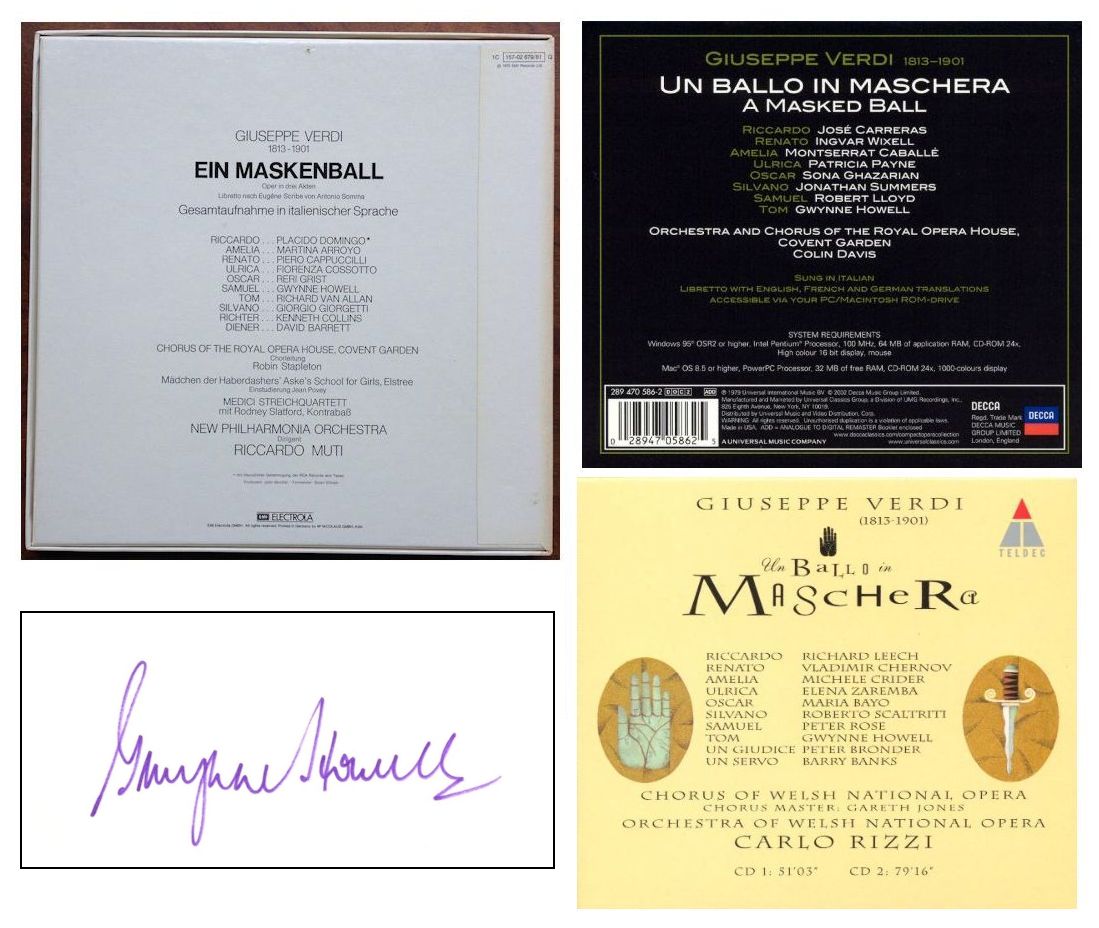
© 1985 Bruce Duffie
This conversation was recorded in Chicago on October 23, 1985. Portions were broadcast on WNIB the following year, and again in 1989, 1993 and 1998. This transcription was made in 2018, and posted on this website at that time. My thanks to British soprano Una Barry for her help in preparing this website presentation.
To see a full list (with links) of interviews which have been transcribed and posted on this website, click here.
Award - winning broadcaster Bruce Duffie was with WNIB, Classical 97 in Chicago from 1975 until its final moment as a classical station in February of 2001. His interviews have also appeared in various magazines and journals since 1980, and he now continues his broadcast series on WNUR-FM, as well as on Contemporary Classical Internet Radio.
You are invited to visit his website for more information about his work, including selected transcripts of other interviews, plus a full list of his guests. He would also like to call your attention to the photos and information about his grandfather, who was a pioneer in the automotive field more than a century ago. You may also send him E-Mail with comments, questions and suggestions.